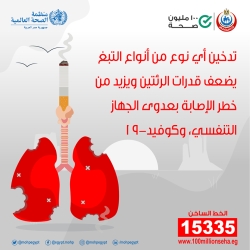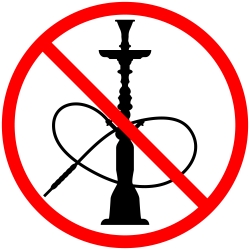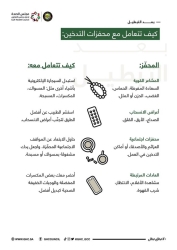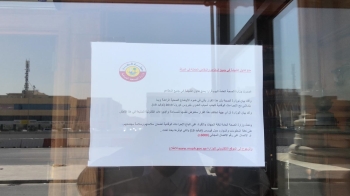Egypt bans waterpipes and ramps up health awareness during COVID-19
Introduction
 The Government of Egypt has setup the Higher Committee for Novel Coronavirus Crisis Management in response to the COVID-19 pandemic. The Committee is tasked with following-up on the implementation of precautionary measures to face the COVID-19 pandemic and develop emergency plans to address any situation arising during the crisis. The Ministry of Health and Population is ramping up health awareness activities during this critical period. Tobacco control was among the priority COVID-19 relevant awareness areas, focusing on a number of tobacco control interventions, such as: enforcing a ban on waterpipes (locally known as shisha) use in public places, running awareness campaigns on deleterious health impact of tobacco use especially during the pandemic, renewing pictorial health warnings on all tobacco products, finalizing the review of tobacco control law and approving accession of Egypt to the WHO Framework Convention on Tobacco Control Protocol to Eliminate Illicit Trade in Tobacco Products.
The Government of Egypt has setup the Higher Committee for Novel Coronavirus Crisis Management in response to the COVID-19 pandemic. The Committee is tasked with following-up on the implementation of precautionary measures to face the COVID-19 pandemic and develop emergency plans to address any situation arising during the crisis. The Ministry of Health and Population is ramping up health awareness activities during this critical period. Tobacco control was among the priority COVID-19 relevant awareness areas, focusing on a number of tobacco control interventions, such as: enforcing a ban on waterpipes (locally known as shisha) use in public places, running awareness campaigns on deleterious health impact of tobacco use especially during the pandemic, renewing pictorial health warnings on all tobacco products, finalizing the review of tobacco control law and approving accession of Egypt to the WHO Framework Convention on Tobacco Control Protocol to Eliminate Illicit Trade in Tobacco Products.
Ban on waterpipes in public places
The Egyptian Ministry of Local Development issued a statement, on 15 March 2020, to all governorates covering the precautionary measures to prevent the spread of COVID-19 as per the Ministry of Health and Population and the World Health Organization (WHO) recommendations in this regard. On the top of these precautionary measures was banning waterpipes in all cafés. In the first few days of implementing the ban, there were some violations which were met with hefty fines reaching up to 40 000 Egyptian Pounds (USD 2500), closures and confiscation of waterpipes. Shortly after the ban, cafés were closed due to lockdown restrictions. Currently, cafés have reopened with social distancing rules and a capacity of 50%, however, the ban on waterpipes continues.
Awareness campaigns during COVID-19
The Ministry of Health and Population has run a nationwide campaign on awareness and precautionary measures to curb the spread of COVID-19. Part of this campaign was directed at highlighting the link between tobacco use and the transmission of the virus that causes COVID-19. Within this campaign, the Ministry used its social media platforms and mobile application, Egypt Health (Sehat Masr), to disseminate its messages widely.
In tandem, the Ministry of Social Solidarity in collaboration with WHO, ran a campaign featuring celebrities in short videos focusing on banning waterpipes. The campaign highlighted the relationship between the use of waterpipes and the spread of COVID-19, calling on individuals to abstain from waterpipe use to protect themselves from the risk of infection. The Ministry disseminated these videos widely on social media platforms.
The Ministry of Health and Population has mitigated misinformation promoted by tobacco companies which claimed that smoking protects individuals from contracting the virus that causes COVID-19. The Ministry put out information clarifying the falseness of these claims to the public. In addition, the Ministry of Health and Population, through its tobacco control focal points spread across the 27 governorates, has managed to run awareness sessions on COVID-19 and the risks associated with smoking. These sessions have been very successful and contributed to curbing the spread of COVID-19 across Egypt.
Renewing pictorial health warnings
The Ministry of Health and Population has worked closely with WHO to select the new set of pictorial health warnings that will be placed on all tobacco products, in line with requirements of the WHO Framework Convention on Tobacco Control in the next two years. The set consists of four well selected pictures that can be adopted and applied on all forms of tobacco products, including heated tobacco products, according to the latest developments in this regard in the Egyptian market.
The new pictorial health warnings will occupy a space of 50% of the display area of the tobacco product pack, which is higher than the typical 30%. They will come into effect as of 1 January 2021, with a grace period of 6 months within 2020, for tobacco companies to allow them to use up their stocks.
Finalizing the review of the national tobacco control law
WHO has worked closely with the Ministry of Health and Population to revise the national tobacco control Law and propose the needed various amendments, which can have a significant impact on the prevalence of tobacco use in the country. The law has been revised by a legal expert to address existing gaps and ensure that it is comprehensive as outlined in the WHO Framework Convention on Tobacco Control. The legal expert will also propose a bylaw and a national strategy on the mechanism for implementing these amendments.
In conjunction with this, WHO in cooperation with the Ministry of Health and Population has successfully completed a limited survey about compliance with tobacco control legislations.
Approval of the Protocol to Eliminate Illicit Trade in Tobacco Products
After several years of joint multisectoral collaboration between Ministry of Health and Population, Ministry of Trade and Industry, Customs Authority and WHO three levels, the Egyptian Cabinet has approved the Protocol to Eliminate Illicit Trade in Tobacco Products after His Excellency President Abdel Fattah Al-Sisi approval. The Protocol will help to eliminate illicit trade in tobacco products which will protect Egyptian population health and economy from the deleterious consequences of illicit trade.
The Protocol has been discussed in a special session by the Egyptian Parliament and consensus of approval has been reached. Following this, the Egyptian Mission in New York will sign the Protocol on behalf of Egypt. Egypt will be the seventh country in the Region to get accession and enter into signatory.
Way forward
Future plans include submitting these amendments, bylaws and national strategies for Her Excellency Minister of Health and Population for her approval and start of implementation. Also translating the same documents into English in order to share them with WHO Framework Convention on Tobacco Control experts for their views. There are plans in place to create a platform for the Egyptian Observatory for the Tobacco Industry. This platform will ensure that the activities of the Observatory are sustained and will enable the effective monitoring of the tobacco industry’s tactics. Moreover, there are plans to support tobacco cessation clinics all over the country in collaboration with the Ministry of Health and Population to encourage tobacco users to quit in this critical time.
Related links
Egypt’s Ministry of Health and Population
Egypt’s Ministry of Health and Population (Facebook)
Lebanon bans waterpipes and adapts smoking cessation services during COVID-19
Introduction
 Lebanon’s Ministry of Public Health has intensified its health awareness activities, in response to the COVID-19 pandemic. The Ministry has setup a Crisis Committee Chaired by His Excellency the Minister of Public Health. The Ministry has launched a mobile application to update the public about the latest COVID-19 related information and health awareness data. The Ministry is focusing on two main areas within tobacco control: enforcing a ban on waterpipe use in public places and adapting smoking cessation services. The Ministry has been leading the efforts of tobacco control through close coordination with the ministries of interior, tourism, media, justice, economics and finance and municipalities.
Lebanon’s Ministry of Public Health has intensified its health awareness activities, in response to the COVID-19 pandemic. The Ministry has setup a Crisis Committee Chaired by His Excellency the Minister of Public Health. The Ministry has launched a mobile application to update the public about the latest COVID-19 related information and health awareness data. The Ministry is focusing on two main areas within tobacco control: enforcing a ban on waterpipe use in public places and adapting smoking cessation services. The Ministry has been leading the efforts of tobacco control through close coordination with the ministries of interior, tourism, media, justice, economics and finance and municipalities.
Ban on waterpipes in public places
A ban on waterpipe use in restaurants and cafés has been implemented during the lockdown period. Lebanon’s Ministry of Public Health has enacted Law 174 and issued memo No. 48/2020 to ban waterpipes in public places, especially restaurants and cafés, as a preventive measure to prevent infection with COVID-19. Lebanon’s Ministry of Public Health together with the Ministry of Interior and Ministry of Tourism, are enforcing the ban. The law, which has been in place for years, is only now being implemented across Lebanon. Mr Fadi Snan, Director of National Tobacco Control Programme at the Ministry of Public Health stated: “COVID-19 helped us implement the law”.
Health inspectors are sent out on a regular basis to check that the ban is being implemented in restaurants, cafés and closed places where waterpipes and tobacco products are served. In cases of violations, the inspectors liaise with the ministries of interior and justice. Violations are met with hefty penalties, such as fines and in the cases of repeat violations, venues are shut down.
Enforcement of the waterpipe ban has been met by some resistance from restaurants and cafés, which consider waterpipes to be the lucrative part of their business. They are lobbying through the Lebanese Regie for Tobacco (Régie Libanaise des Tabacs et des Tombacs) for waterpipes to be allowed in open places, especially those with swimming pools as soon as the lockdown restrictions are relaxed. Economic factors have also facilitated the implementation of the ban, especially the value plunge of the Lebanese pound against the U.S. Dollar, which has created a steep rise in prices of imported tobacco products three-fold. The ban on waterpipes has continued during the initial period after the lockdown, however, using waterpipes in the privacy of homes especially by youth still poses a challenge.
Adapting smoking cessation services
Lebanon’s Ministry of Public Health is working closely with seven cessation centres across Lebanon. The Ministry is publicising the services of these centres through their website and centres are providing their services at a reduced fee for patients coming through the Ministry website. Providing tobacco cessation medications represents a challenge due to the difficulty to supply them within lockdown restrictions, so many of the centres are providing medication-free treatment plans or focusing more on psychological support. A cessation hotline (1214) is available and publicized widely for any tobacco cessation related enquiries. This year on World No Tobacco Day, the Ministry publicized widely on its website and social media platforms the link between smoking and COVID-19, using World Health Organization videos and materials which highlighted that smokers come from all walks of life.
Way forward
The Government of Lebanon has developed a country-wide five-phase transition plan to start lifting coronavirus restrictions and eventually return to normal activities, subject to the COVID-19 situation across the country. Currently, there is a ban in restaurants and cafes due to the COVID-19 situation in the country.
Related links
Official page for national tobacco control in Lebanon
Official page for national tobacco control in Lebanon (Facebook)
The new version of Lebanon’s Ministry of Public Health mobile application
Oman bans waterpipes and creates national awareness during COVID-19
Introduction
 His Majesty Sultan Haitham bin Tarik, Sultan of Oman appointed a Supreme Committee in response to the COVID-19 pandemic. The Committee is tasked with tackling developments resulting from COVID-19 and ensuring preventive measures are in place to curb the pandemic. The Committee is headed by His Excellency the Minister of Interior and is formed from officials representing key ministries and government entities. The Head of the National Tobacco Control committee and Undersecretary of the Ministry of Health is a member of the Supreme Committee. The Ministry of Health is focusing on two main areas in tobacco control: enforcing a ban on waterpipe use in public places, and recognizing World No Tobacco Day 2020 and linking its activities to COVID-19.
His Majesty Sultan Haitham bin Tarik, Sultan of Oman appointed a Supreme Committee in response to the COVID-19 pandemic. The Committee is tasked with tackling developments resulting from COVID-19 and ensuring preventive measures are in place to curb the pandemic. The Committee is headed by His Excellency the Minister of Interior and is formed from officials representing key ministries and government entities. The Head of the National Tobacco Control committee and Undersecretary of the Ministry of Health is a member of the Supreme Committee. The Ministry of Health is focusing on two main areas in tobacco control: enforcing a ban on waterpipe use in public places, and recognizing World No Tobacco Day 2020 and linking its activities to COVID-19.
Ban on waterpipes in public places
The Supreme Committee, on 12 March 2020, issued a ban on use of waterpipes in all licensed outlets effective as of 15 March 2020 for the period of one month. Oman’s Ministry of Health has been in close contact with the three different Omani municipalities, which in their turn took forward this ban across Oman and successfully implemented it. The municipalities issued their orders to ban waterpipes and communicated this widely using their social media platforms especially through Facebook and Twitter. Dr. Jawad Al-Lawati, Senior Consultant and Rapporteur for the National Tobacco Control Committee at the Ministry of Health stated: “When there is a political will, implementation is quite easy, this is the case with the waterpipe ban during the outbreak of COVID-19”. The ban is still in place because restaurants and cafes are still closed to date and mass gatherings are disallowed.
Recognition of World No Tobacco Day and linking its activities to COVID-19
To coincide with World No Tobacco Day 2020, the Department of Health Promotion and Health Education at the Ministry of Health developed a number of video clips linking tobacco use to the transmission of the virus that causes COVID-19. The videos were aired at peak times during news breaks. Key television programmes hosted physicians to talk about the topic. Dr. Ahmed Al-Wahaibi, a consultant and healthcare physician, was hosted on national radio and the main TV channel to talk about the risks of tobacco use and COVID-19. Oman’s Ministry of Health used its social media platforms especially Facebook and Twitter, in cooperation with the World Health Organization (WHO), to disseminate many health awareness and tobacco control messages.
Way forward
The Supreme Committee is continuing to monitor the COVID-19 situation and will move forward accordingly. The Committee is preparing a plan to return to normal activities and there has been some consultation with WHO.
The Ministry of Health has already conducted a study—published in June—to identify the clinical characteristics and outcomes of hospitalized patients with COVID-19 in Oman. Within this study the link between tobacco use and the transmission of the virus that causes COVID-19 has been explored on a sample of 63 patients and there is a view to explore this further in the future.
Related links
Ban on all licensed shisha outlets from Sunday (Oman Daily Observer)
Oman’s Ministry of Health e-portal
Oman’s Ministry of Health (Twitter)
Residents in Oman welcome temporary ban on new shIsha cafes (The Arabian Stories)
Qatar bans waterpipes, creates national awareness and adapts smoking cessation services during COVID-19
Introduction
 The State of Qatar set up the Supreme Committee for Crisis Management to respond to the COVID-19 pandemic and the Ministry of Public Health is ramping up health awareness activities during this critical period. Qatar’s Ministry of Public Health is focusing on three main areas within tobacco control: enforcing a ban on waterpipe use in public places, a national awareness campaign and smoking cessation services.
The State of Qatar set up the Supreme Committee for Crisis Management to respond to the COVID-19 pandemic and the Ministry of Public Health is ramping up health awareness activities during this critical period. Qatar’s Ministry of Public Health is focusing on three main areas within tobacco control: enforcing a ban on waterpipe use in public places, a national awareness campaign and smoking cessation services.
Ban on waterpipes in public places
Qatar’s Ministry of Public Health, on 10 March 2020, issued a decision banning waterpipes in all restaurants and cafés. The Ministry clarified that the decision came in light of current health conditions as well as in line with precautionary measures to prevent the spread of COVID-19. The decision was published in the official newspaper and disseminated widely across social media platforms. Health inspectors were sent out to enforce the ban and immediately all restaurants and cafés responded by removing waterpipes. Health inspectors are regularly monitoring the implementation of the decision. To date, the implementation rate is 100% with no reports of violations. Some restaurants and cafés have displayed stickers indicating the ban on waterpipes.
The ban on waterpipes in all restaurants and cafés will remain in effect until further notice. Dr Kholood Al Mutawa, Head of Non-Communicable Diseases Section at the Public Health Department, stated: “We expect that the ban will continue till further notice by the Supreme Committee for Crisis Management and the Ministry of Public Health, things will not go back to be the same”. As a result of the ban, waterpipe tobacco mix (Mu’assal) imports have dropped by 40%.
Following the ban, the Ministry of Public Health has worked closely with the Ministry of Commerce and Industry to facilitate the issuance of all licenses for restaurants and cafés except those for waterpipe use. This further ensured the smooth implementation of the banning decision.
Awareness campaign during COVID-19
Qatar’s Ministry of Public Health launched a COVID-19 awareness page on its website, covering all data and updates related to the pandemic. The Ministry is working closely with the Hamad Medical Corporation to run country-wide awareness campaigns. They are coordinating closely to ensure alignment of messages. The messages focus on COVID-19 prevention, protection and risk factors – smoking is highlighted as one of the key risk factors. The awareness campaign uses social media (Facebook, Instagram, Twitter and YouTube) alongside newspapers. The messages are also disseminated through EHTERAZ, a mobile application, developed by the Ministry of Interior which is working closely with the Ministry of Public Health on public health awareness.
Adapting smoking cessation services
The Hamad Medical Corporation Tobacco Control Centre – WHO Collaborating Centre – has shifted its smoking cessation services to phone consultations to enable continuing its operation in light of the current lockdown and restrictions. The consultation includes an extensive assessment to generate a personalized quitting plan, psychological support and a follow-up appointment. In addition, a 24/7 smoking cessation hotline was established by the Centre. The hotline serves as a counselling hub where inquiries are addressed by a smoking cessation specialist at all times. In addition, prescribed medications are home delivered within 24 hours across the State of Qatar without having to attend the healthcare facilities.
These services have proven their success as the Centre witnessed a noticeable increase in their uptake. Accordingly, the Centre tripled the number of functional clinics throughout the week. All patients using the services have expressed their satisfaction with the efficiency of phone consultations and the short time needed to secure an appointment at the Centre. Consequently, this has impacted positively on engagement and response rates.
To further support and promote smoking cessation, a number of WhatsApp groups were created to disseminate health messages and tips amongst patients. These messages and tips were also posted on all the Centre’s social media platforms. In conjunction with these efforts, a number of TV channels have hosted the Centre’s specialists through phone interviews to spread awareness about the link between tobacco use and the transmission of the virus that causes COVID-19. The Centre has also received wide media coverage highlighting its role during this period.
Way forward
The Supreme Committee for Crisis Management has developed a country-wide transition plan to start lifting COVID-19 restrictions and eventually returning to normal activities, subject to the COVID-19 developments across the country. The plan, which started its first phase on 15 June 2020, consists of four phases. The first phase covered two weeks and the remaining three phases to cover one month each, with the last phase starting 1 September 2020.
In the second phase of the plan, shopping malls and markets are planned to open with limited capacity. Within the plan, there is a ban on smoking in front of mall entrances and main gates in addition to removal of all smoking-related aides such as ashtray bins. Malls will be required to place “No smoking” signs outside their main entrances.
The Hamad Medical Corporation Tobacco Control Centre is working on extending the current smoking cessation hotline into a national toll-free quit line.
Related links
Hamad Medical Corporation post on what happens to your body when you quit smoking (Instagram)
Qatar’s Ministry of Public Health bans shisha/hookah in all restaurants and cafés
Qatar’s Ministry of Public Health website coronavirus (COVID-19) page


